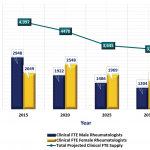
Amid growing concern of a potential shortage of physicians in the near future, the ACR has been looking closely at how we can efficiently handle the increasing demand for patient care. The changes in demographics of our trainees, the need for nurse practitioners (NPs) and physician assistants (PAs), and the initiation of healthcare reform will significantly impact our future projections. Increasing the size and diversity of our workforce requires that we be innovative, from how we run our practices now to thinking about who will run and work in our practices in the future.
Choosing Rheumatology
More than half (58.7%) of the 395 fellows-in-training who participated in the 2010 Adult In-Training Exam indicated that they made the decision to pursue rheumatology during their residency. These numbers are consistent with national trends and highlight the need to increase exposure to rheumatology during the early years of training.
The Association of Program Directors in Internal Medicine and the Association of Specialty Professors recently presented a joint proposal to the ACR suggesting that we change the timing of the match in rheumatology from June of the second year of residency to December of the third year of residency. Under the new schedule, third-year residents would submit fellowship applications in July and interviews would take place from late summer through early November. Applicants and programs would submit rank order lists in mid-November, and the match would take place in early December.
Why the proposed change? In 2004, the American Journal of Medicine published data stating that nearly 69% of internal medicine residents felt the subspecialty match date was too soon to make an informed decision.1 To facilitate an informed decision-making process, residents must have up-to-date and comprehensive information as they make specific plans about their future career path. Information such as professional development opportunities, supply and demand of subspecialists, lifestyle, and compensation packages are important factors to consider. Having such information is not only in the interest of individual students, it is also essential for ensuring the preparation of a physician workforce capable of meeting the needs of an ever-growing population.
When polled about the change, 92% of adult program directors responded they were in favor of it. Both the National Resident Matching Program and the Electronic Residency Application Service have vetted this proposal for feasibility. If implemented, the change would be effective July 1, 2013.
Increased Funding for Fellowship Positions
Findings of the 2008 ACR Academic Workforce Study indicated that nearly 25% of unfilled Accreditation Council for Graduate Medical Education (ACGME)–accredited fellowship positions were empty due primarily to insufficient funding for fellows’ salaries. What can the ACR do to combat the lack of funds for fellowship positions in the short term? We could all think of a dozen or more ways to effectively spend our way out of the funding deficit; however, a key step in reaching the goal of having more rheumatology fellows is building a sustainable organizational structure capable of developing mechanisms to increase fellowship positions across the country.


